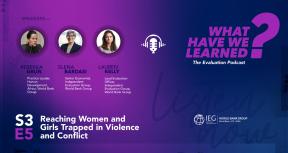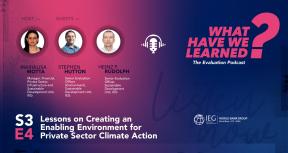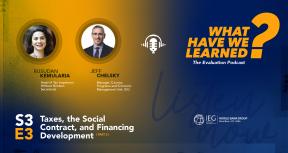Listen on: Apple Podcast, Spotify, or Google Podcasts
Tax revenues are a critical source of financing in every country. Especially with increased debt pressures in the wake of the pandemic, and governments struggling to fund a myriad of demands, from health sector capacity building to climate change action. A country’s tax system is also a reflection of its social contract and priorities.
However, revenue collection lags government needs in developing and emerging economies because of narrow tax bases, large informal sectors, and the often-difficult political economy of tax reform. How can the World Bank and partner organizations better support countries increase their tax revenues?
The second episode on this series about taxes, or domestic revenue mobilization, features a conversation between IEG host Jeff Chelsky and Rusudan Kemularia, Head of the Tax Inspectors Without Boarders Secretariat at the Organization for Economic Cooperation and Development.
TRANSCRIPT
Jeff Chelsky: Good day. I'm Jeff Chelsky, manager of the Economic Management and Country Programs Unit of the Independent Evaluation Group in the World Bank, and this is What Have We Learned? The Evaluation Podcast. Today we continue our series on one of everyone's favorite topics, taxation, or more broadly, domestic revenue mobilization, or DRM, which has become an increasingly important part of international and country level development policy agendas as countries face rising needs for development finance.
In 2015 at the International Conference on Financing for Development in Addis Ababa, the World Bank was among the multilateral institutions that committed to stepping up their efforts to support this critical source of financing, pledging to ramp up its assistance to client countries.
But despite increasing attention to domestic revenue mobilization, tax yields in many low and middle-income countries even before COVID were on a declining trend. Since the onset of the pandemic, tax revenues have dropped by 12% in real terms. In many countries, ratios of tax to GDP have fallen below 15%, which is considered the minimum necessary to finance a state's basic functions.
World Bank support for domestic revenue mobilization in the period following the 2015 World Conference on Financing for Development and leading up to the COVID pandemic was the subject of a recent IEG evaluation. The evaluation confirmed that the World Bank had intensified its attention to domestic revenue mobilization, particularly since 2018 and especially to countries eligible for IDA, the World Bank's Fund for the poorest countries.
However, the results have fallen short of expectations, and tax reforms have sometimes proven hard to sustain.
To discuss this topic I will be speaking with Rusudan Kemularia, Head of the Tax Inspectors Without Borders Secretariat, at the Organization for Economic Cooperation and Development. Prior to joining the OECD, Ms. Kemularia was Georgia's vice minister of finance from 2010 to 2012, leading work on tax reforms and other areas of public finance including customs policy and administration. In addition to her ministerial role, she was also secretary to the parliament and co-chair of the Tax Dispute Resolution Council.
Welcome, Rusudan.
Rusudan Kemularia: Thank you, of course.
Jeff Chelsky: Now, not all our listeners will have heard of Tax Inspectors Without Borders (TWIB). Could you briefly explain its work and mandate and the countries in which it operates?
Rusudan Kemularia: Tax Inspectors Without Borders is a joint initiative of the Organisation for Economic Co-operation and Development (OECD) and United Nations Development Programme (UNDP) that embeds tax experts in developing countries' tax administrations to provide a practical hands-on assistance on the real audit cases and related international tax issues.
It works like Doctors Without Borders or Journalists Without Borders. We work in more than 60 jurisdictions with over 120 current and completed programs. It's really about a practical hands-on assistance. It's about sharing knowledge and experience on the ground, and it's based on a learning by doing approach. We have mobilized, together with African Tax Administration Forum and the World Bank Group, almost 2 billion USD through TIWB programs. Also, almost 5 billion tax assessments through TIWB programs across Africa, Asia, Latin America and the Caribbean, and Eastern Europe. Our work compliments to the broader capacity building assistance provided by other international players. Our main objective is building audit capacity within the tax administrations and help countries mobilize tax revenues.
Jeff Chelsky: Where do the staff for TWIB come from? Are they retired tax inspectors from other countries, or how are you staffed?
Rusudan Kemularia: The TIWB experts are mainly sourced from the UNDP roster. These are the retired or current officials. Also, 24 tax administrations of developed economies are supporting the initiative.
Jeff Chelsky: Excellent. Well, let's get right into the issue. Post-COVID, how would you describe the challenge of and priorities for raising tax revenue in developing economies? Are the challenges different for low-income countries than in middle-income countries?
Rusudan Kemularia: Good question. Post-COVID developing economies face challenges in raising tax revenues due to economic disruptions, reduced economic activity, and of course increased government spending. While the challenges might not distinctly differ between low- and middle-income countries, the resource constraints are more pronounced in low-income economies. They often require a greater external support for capacity building and implementation. This is what we have seen through TIWB programs. And now, post-pandemic, we see countries are prioritizing the audit work again. The priority is of course to raise the tax revenue and to build the capacity. The countries are very proactive, I would say post-COVID.
Jeff Chelsky: What role do you see for the World Bank in supporting tax collection efforts in developing economies? Where should the World Bank focus its efforts, on tax policy, tax administration, or working with partners like TIWB?
Rusudan Kemularia: The World Bank definitely can play an important role in supporting tax collection in developing economies. But effective collaboration among various organizations, institutions and administrations is essential for both tax policy and tax administration. I think there is a need in developing countries to designing the tax policy, and also helping in implementing the regulations. Especially international standards and international tax. Prioritizing tax administration can rapidly achieve concrete outcomes. By investing in capacity building programs, also offering technical guidance and fostering initiatives like TIWB, the World Bank can significantly enhance the efficiency and effectiveness of the tax administration. I think the World Bank's influence can also extend to aiding the implementation of improved tax policies as well by providing expertise, resources, and guidance. The institutions of course can assist developing economies in crafting sound tax policies that align with their socioeconomic goals.
Jeff Chelsky: Very interesting because one of the findings of the IEG evaluation was that the World Bank actually shifted its focus from tax administration to tax policy. Most of the support that low-income countries received was on the tax policy side. There was actually very little increase in investment projects for tax administration, but we will get to that momentarily.
One of the ways that taxes can be collected in developing economies is through so-called Large Taxpayer Units (LTUs). Do you see these as playing a particularly important role in developing economies? If so, what role can the World Bank and other multilateral development banks play in helping to establish and improve the functioning of LTUs?
Rusudan Kemularia: LTUs hold a crucial position in developing economies by focusing on sizable contributions to a total tax revenue. I think these units streamline processes, increase compliance and boost revenue collection. We see that they contribute immensely when it comes to the collection of taxes. I think the World Bank and other development banks can support the establishment and capacity building of the LTUs by providing trainings, technology, and of course best practices to improve tax administration. But also, by supporting effective communication between LTUs and the taxpayer. This is where we've seen that TIWB have been a game changer because the taxpayers and the companies need to know what to expect from the tax administrations. If the LTUs are well-prepared, they know exactly what type of information they have to request. There is no barrier between the taxpayer and the different units at the tax administrations. It's very important to help the administration in building audit capacity, and also the integrity within the tax administration system.
Jeff Chelsky: Now, IEG's evaluation of World Bank support for domestic revenue mobilization found a number of shortcomings in the World Bank's support on the tax front. These included under-investment in support to build capacity, capacity building for tax administration, especially in low-income countries. Does this finding resonate with your experience over the last five or so years? If so, what would you suggest as a remedy?
Rusudan Kemularia: So, low-income countries do require support in enhancing domestic revenue mobilization. However, assistance should be demand driven. What I can say from the TIWB perspective is that the demand is high. We see that demand is increasing not only for the practical audit and international tax, but rather in other areas such as criminal tax investigations, a thematic exchange of information, tax and environment, and of course the implementation of the two-pillar solution. Especially the practical implementation of global minimum tax rules. We see that the demand is coming. Maybe we need to work in more coordination to also increase awareness about the programs and assistance which we are providing to developing countries.
Jeff Chelsky: Now, IEG's evaluation also pointed to problems with sustaining tax reform. This was particularly the case with respect to reducing tax expenditures and eliminating inefficient tax exemptions. Often, reversals were a response to ongoing pressures from vested interests. Is this a phenomenon that you've seen? What can be done to increase the chances that tax reforms supported by development partners stick and are sustained?
Rusudan Kemularia: Yeah, it's a very complex issue, and I think it has different dimensions. But very simply, when reforms are tailor-made for a country they resonate better, whether it's economic and social dynamics. This approach involves engaging the stakeholders early on, ensuring they feel a sense of ownership, and that's very important. Effective communication is also crucial by clearly articulating the benefits of the reforms to the public. I think we can build broader support and increase the chances that reforms supported by development partners are sustained. I'm talking from my previous experience as Vice Minister of Finance, leading together with my team the tax reforms in my country. There is no one size fits all solution. A key approach is to design reforms proactively and tailored to each country's unique circumstances. This is I think most important. Understanding the local regulations, cultural sensitivities, and other defining aspects is essential to align reforms with the reality.
Jeff Chelsky: In many ways, this is very consistent with the evaluation's finding that the willingness of taxpayers to comply and to pay tax is partly a function of the extent to which they see themselves receiving valuable and high-quality services from governments. If governments are not able to show that they're using the tax revenues to the benefit of their people, taxpayers are unlikely to want to sustain compliance. Is this something you also saw in your time in Georgia?
Rusudan Kemularia: Absolutely. It's about a social contract between state and taxpayers and the citizens. It works if there is communication and the taxpayers see that the tax administration is responsive. They're not acting as an enemy, rather they're using taxes for providing services and public goods. The key factor also is the fighting corruption, which is slightly a different topic, but I think it's important also for building the modern tax administration. It's a key for any tax reform to fight and eliminate red tape and the corruption within the systems. We see this especially in developing countries creating also strong judiciary systems. It's very complex. Indeed, I think it's important to demonstrate a goodwill from the tax administration side. Also, not focusing on aggressive tax administration, rather creating taxpayer friendly environment through the liberal tax systems, clear procedures, and of course with the daily contact with the taxpayers.
Jeff Chelsky: Now, an important objective of the World Bank's approach to domestic revenue mobilization is increasing the progressivity of tax systems in developing economies. What's your view on how progressivity can be achieved? Can it be effectively addressed from the tax side alone?
Rusudan Kemularia: It's always about equity efficiency. I will not go into the depth of it, but I think progressive taxation in developing countries definitely can play a crucial role in domestic resource mobilization by increasing government revenue through an equitable distribution of the tax burden. Achieving progressivity definitely entails implementing gradual tax rates, reducing exemptions, introducing wealth taxes, and enhancing enforcement mechanisms. While progressivity offers significant benefits, it is important to recognize potential challenges to its implementation in developing countries. These challenges may include, for example, resistance from affluent segments of society, difficulties in accurately assessing income levels, and the need for effective enforcement mechanisms. I think it is crucial for us to consider wider economic context and endorse complimentary policies to ensure the success of enhancing the progressivity of tax systems in developing economies.
Jeff Chelsky: Rusudan, you've been very generous with your time. Let me ask you one final question, do you have any advice that you would like to give to the World Bank and its partners on how to increase the effectiveness of their support for domestic revenue mobilization in order to achieve growth?
Rusudan Kemularia: It sounds very ambitious to provide any advice to World Bank, but I think promoting collaborative efforts among development partners is key, including with governments and stakeholders, to maximize impact and coordinate initiatives to ensure countries leverage programs effectively toward achieving the 2030 agenda. Also, recognize the unique needs of each country as there is no one-size-fits-all solution to support domestic revenue mobilization. I think that's most important.
Jeff Chelsky: That sounds like good advice. Now, unfortunately we're out of time, so I have to end here. I have been speaking with Rusudan Kemularia, head of the Tax Inspectors Without Border Secretariat at the OECD. I'm Jeff Chelsky, manager of the Economic Management and Country Programs Unit and the Independent Evaluation Group at the World Bank. This is What Have We Learned? The Evaluation podcast. Please join us next time for more on tax and other exciting issues.
This Episode’s Featured Guests:








